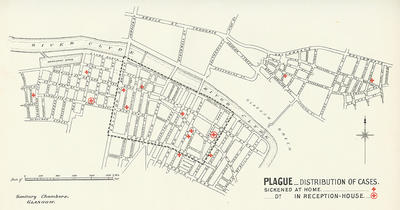
It seems incredible that bubonic plague, a disease normally associated with medieval times, should have made an appearance in Glasgow as recently as 1900. But that is what happened, when a total of forty-eight cases resulted in sixteen deaths. As can be seen from this map, a wide area of the city was affected.
The first cases occurred in early August in a house in Rose Street, Gorbals, where a docker and his family were infected. The practice of holding wakes for the dead helped spread the disease, together with insanitary housing conditions. Deaths were attributed to various causes, and it was not until 25 August that the unlikely diagnosis of plague was made, by a doctor in Belvidere Hospital.
The authorities responded quickly to the diagnosis. Contacts were identified and sometimes quarantined; houses were fumigated and evacuated; clothing and bedding were disinfected; staff in hospitals and reception houses were inoculated and wakes were prohibited. Publicity was avoided to prevent panic, and the outbreak was contained. The official report concluded that the most likely cause was an infected rat carried aboard one of the many ships from around the world that had visited the port of Glasgow.
Reference: Mitchell Library, Gf 616.9232
Reproduced with the permission of Glasgow City Council, Libraries Information and Learning
Keywords:
Belvidere Hospital, bubonic plague, fumigation, infectious diseases, inoculation, maps, public health, rats, wakes
You have 0 images in your photo album.